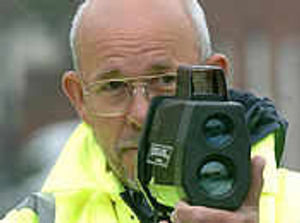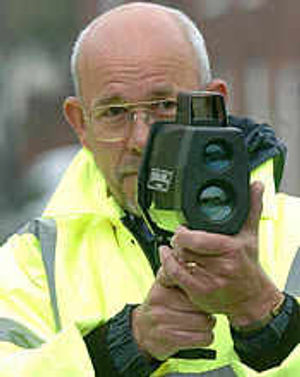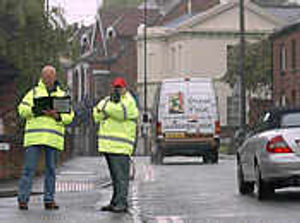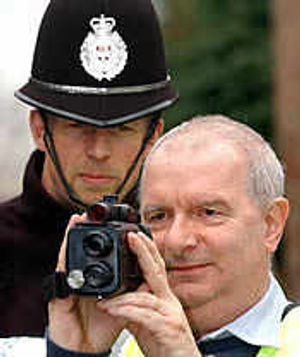It's the speedwatch police
It's not hard to tell a motorist who's just been 'shot' with a speed gun - they are the ones madly waving their hands after unleashing a torrent of body language, writes Ben Bentley.


Other signs are even easier to spot.
"The odd one will give you the old 'Harvey Smith' or call your parenthood into question," says David Dovaston, the man with golden speed gun.
David, from Shifnal, is among a growing number of ordinary people who are taking to the streets armed with laser speed guns in an effort to make roads in our county towns and villages safer.
The community speedwatch scheme he has set up in his town with ten volunteers and the blessing of the police is the latest such venture in Shropshire, and in the few months it has been operating has already hit speeding drivers hard.
David indicates a substantial list of cars found flouting the 30mph speed limit during a typical two-hour session.
A number of these drivers will have received warning letters from the local constabulary as a result. If another limit-breaking speed is recorded a second letter will act as a final warning and police action can be expected.
David says that the only way they can justify having a speedwatch scheme is if ultimately it is successful in driving down average road speeds. Time will tell, but the drive to cut average speeds isn't helped by the presence of, as David calls them, boy racers.

"You've got the entrance to the school nearby and one or two idiots who think it's great fun to show off in their cars when you've also got a lot of youngsters who are out playing."
He tells of a particular 'game' that some so-called boy racers are fond of on the Newport Road where there is an electronic sign that tells motorists how fast they are driving.
David explains: "They drive up to the golf club and turn round with all their mates in the back and drive past trying to get the sign to say the highest speed - and take a photograph of the speed with on their mobile phones. We had one idiot reported doing 82mph."
Clearly boy racers are at the extreme end of the speeding spectrum; it is largely the everyday driver being caught drifting over the speed limit, more oblivious than stupid.
There is no doubting the effect upon motorists having a camera pointed at their cars by a group of people in fluorescent coats. Most slow down visibly, and if they were Starsky and Hutch before they are more like Rosemary and Thyme now.
In this line of work, adverse reaction to the team's presence comes with the territory, which is normally a grass verge on the side of the highway. David recalls an example.
"The driver went through a 30mph area at 39mph, saw us and went to the end of the road and came back," he says.

"You get all sorts of things said, like 'Are you human?' But you've got to be prepared to put up with it."
David doesn't really mind the name-calling and jokes that his lifelong nickname might be evolving as a result of him operating a speed camera.
"It's Dusty - that's what I'm known as the length and breadth of the land - but it's developed on a bit from that now."
The point is that the sight of the camera crew is a deterrent in itself. During one speed check patrol a roadsweeper is clocked at a reassuring 20mph, followed by a Land Rover travelling at 26mph. As its driver passes he drops his jaw in a manner that seems to suggest: "If that's over the limit then I'm a monkey's uncle."
An Astra driver sails by and David's speedgun registers 24mph. Hardly over the limit, but then what the speed camera does not record is the fact that the male driver is wearing what look suspiciously like a pair of iPod earphones.
Within minutes of setting up and despite the high visibility presence of the volunteer team, a number of cars break the 30mph limit, including a Volvo driver at 36mph and a Mondeo driver at 42mph and the driver of a people carrier at 37mph who passes the checkpoint, turns around and drives past again - this time giving a 'look'.
As as the camera only records the speed of a vehicle, the team has just a few seconds to jot down the registration, colour of the car and the time of the incident and David says the team can have a harder job conducting checks than their partners, the police.
But he is determined to make the county's latest speedwatch scheme a success and that in a year's time the average speed figures they record will have fallen significantly.
"The message is getting out there that we have had enough," he says.
By Ben Bentley




